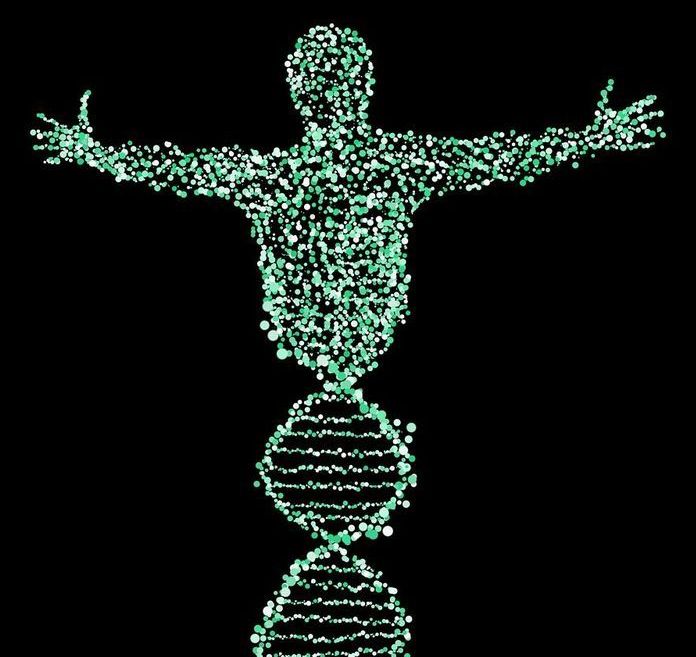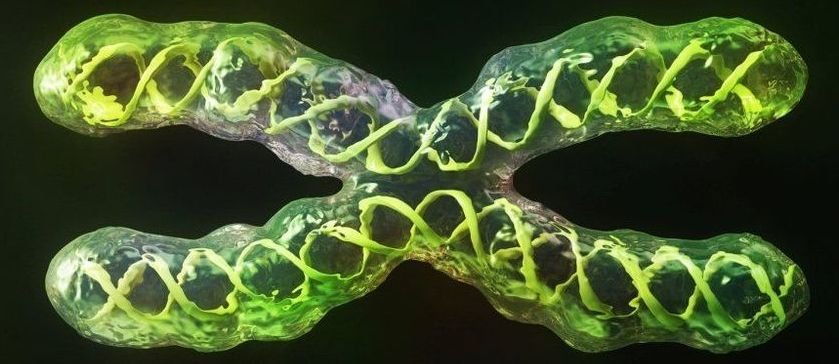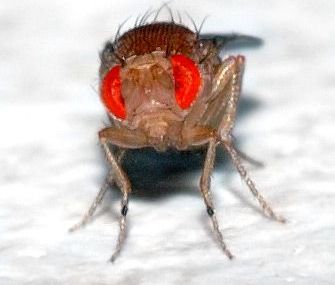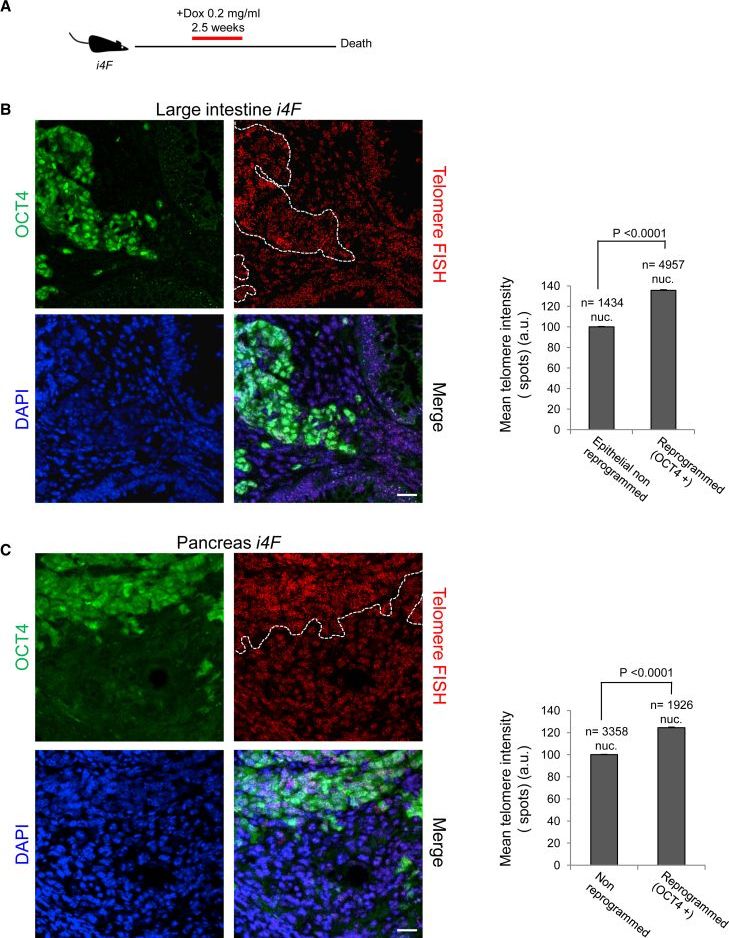Archive for the ‘life extension’ category: Page 311
Jul 15, 2020
Geneticists sequence the complete human X chromosome for the first time
Posted by Genevieve Klien in categories: biotech/medical, genetics, life extension
For the first time, scientists have determined the complete sequence of a human chromosome, namely the X chromosome, from ‘telomere to telomere’. This is truly a complete sequencing of a human chromosome, with no gaps in the base pair read and at an unprecedented level of accuracy.
A step closer towards the complete blueprint of a human being
The Human Genome Project was a 13-year-long, publicly funded project initiated in 1990 with the objective of determining the DNA sequence of the entire human genome.
Jul 14, 2020
For The First Time, Scientists Have Completely Sequenced a Human Chromosome
Posted by Quinn Sena in categories: biotech/medical, genetics, life extension
In 2003, history was made. For the first time, the human genome was sequenced. Since then, technological improvements have enabled tweaks, adjustments, and additions, making the human genome the most accurate and complete vertebrate genome ever sequenced.
Nevertheless, some gaps remain — including human chromosomes. We have a pretty good grasp of them in general, but there are still some gaps in the sequences. Now, for the first time, geneticists have closed some of those gaps, giving us the first complete, gap-free, end-to-end (or telomere-to-telomere) sequence of a human X chromosome.
The accomplishment was enabled by a new technique called nanopore sequencing, which enables ultra-long-reads of DNA strands, providing a more complete and sequential assembly.
Jul 14, 2020
Lifespan.io Launches Lifespan News
Posted by Montie Adkins in categories: biotech/medical, genetics, life extension

In this premier episode of Lifespan News, Brent Nally discusses Unity Biotechnology’s human trials of novel senolytic drugs, including a Phase 2 human trial of a senolytic drug for knee osteoarthritis; two proteins that allow LDL cholesterol to enter our cells; Ponce de Leon Health and epigenetic age reversal; the reason why naked mole rats are so resistant to cancer; XPrize adding longevity to its impact roadmaps; and a promo code for Ending Age-Related Diseases 2020, our upcoming online conference.
You can get your ticket to EARD2020 at https://www.eventbrite.com/e/ending-age-related-diseases-202…4918805703
Jul 12, 2020
The Booming Space Economy
Posted by Lola Heavey in categories: economics, finance, life extension

The current market is expected to balloon to $1.0-$1.5 trillion in the next 20 years. Not even the anti-aging industry is worth that much!
The next decade is going to be an important one, with declining costs & advanced technology propelling the space economy to new highs. We have never been closer to the final frontier.
Jul 10, 2020
Scientists may have found one path to a longer life
Posted by Kevin Huang in categories: biotech/medical, life extension
Scientists at USC Dornsife College of Letters, Arts and Sciences may have found the beginnings of a path toward increasing human lifespan.
The research, published July 10 by the Journal of Gerontology: Biological Sciences, shows the drug mifepristone can extend the lives of two very different species used in laboratory studies, suggesting the findings may apply to other species, including human beings.
Jul 9, 2020
Common Telomere Changes during In Vivo Reprogramming and Early Stages of Tumorigenesis
Posted by Montie Adkins in categories: biotech/medical, life extension
Reprogramming of differentiated cells into induced pluripotent stem cells has been recently achieved in vivo in mice. Telomeres are essential for chromosomal stability and determine organismal life span as well as cancer growth. Here, we study whether tissue dedifferentiation induced by in vivo reprogramming involves changes at telomeres. We find telomerase-dependent telomere elongation in the reprogrammed areas. Notably, we found highly upregulated expression of the TRF1 telomere protein in the reprogrammed areas, which was independent of telomere length. Moreover, TRF1 inhibition reduced in vivo reprogramming efficiency. Importantly, we extend the finding of TRF1 upregulation to pathological tissue dedifferentiation associated with neoplasias, in particular during pancreatic acinar-to-ductal metaplasia, a process that involves transdifferentiation of adult acinar cells into ductal-like cells due to K–Ras oncogene expression. These findings place telomeres as important players in cellular plasticity both during in vivo reprogramming and in pathological conditions associated with increased plasticity, such as cancer.
Keywords: in vivo reprogramming, telomeres, stem cells, TRF1, tumorigenesis, cellular plasticity, cancer, transdifferentiation, ADM, regeneration.
Reprogramming into full pluripotency has been achieved in vivo in the context of mouse tissues (Abad et al., 2013). Thus, induction of the reprogramming factors in transgenic mice (so-called reprogrammable mice) results in reprogramming events marked by the expression of the pluripotency factor NANOG in multiple organs, tissue dedifferentiation, and teratoma formation. Therefore, these mice could be useful for a deeper understanding of the molecular mechanisms that govern tissue dedifferentiation in vivo. Interestingly, mammalian cell reprogramming can also occur spontaneously during regeneration after injury or damage conditions (Yanger et al., 2013). Differentiated cells can be converted in vivo into another cell type and also into functional multipotent stem-like cells (Tata et al., 2013). This capacity of somatic cells to dedifferentiate into stem-like cells in vivo may have a pivotal role in physiological tissue regeneration or during tumorigenesis.
Jul 9, 2020
Brain benefits of exercise can be gained with a single protein
Posted by Genevieve Klien in categories: biotech/medical, life extension, neuroscience
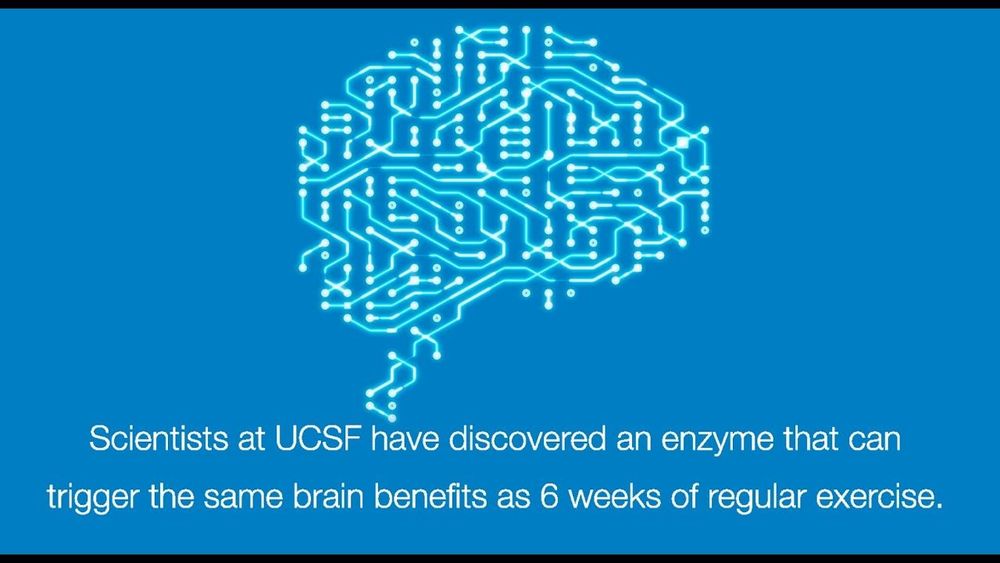
A little-studied liver protein may be responsible for the well-known benefits of exercise on the aging brain, according to a new study in mice by scientists in the UC San Francisco Eli and Edythe Broad Center for Regeneration Medicine and Stem Cell Research. The findings could lead to new therapies to confer the neuroprotective effects of physical activity on people who are unable to exercise due to physical limitations.
Exercise is one of the best-studied and most powerful ways of protecting the brain from age-related cognitive decline and has been shown to improve cognition in individuals at risk of neurodegenerative disease such as Alzheimer’s disease and frontotemporal dementia —even those with rare gene variants that inevitably lead to dementia.
Continue reading “Brain benefits of exercise can be gained with a single protein” »
Jul 7, 2020
More Humanin Increases Chances for Healthier Living to 100
Posted by Kevin Huang in categories: biotech/medical, life extension
Jul 7, 2020
Among older adults, statin use tied to decreased risk of death
Posted by Kevin Huang in categories: biotech/medical, life extension, neuroscience
Study after study has shown that statins can prevent heart attacks, strokes and death in middle-aged adults. But in 28 major clinical trials of statins, only 2 percent of participants have been 75 years or older. This means that even though older adults are at greater risk of heart disease and death, there is scant data on whether statins should be prescribed for them.
A new study led by investigators from Brigham and Women’s Hospital and VA Boston Healthcare System leverages national data from the U.S. Veterans Health Administration Services and Centers for Medicare & Medicaid Services to shed new light on the role statins may play for older adults who have not yet experienced a heart attack, stroke or other cardiovascular event. In their retrospective analysis, the researchers found that the risk of dying from any cause was lower by 25 percent among veterans who were using statins compared to those who were not treated with statins. The risk of dying from a cardiovascular event, such as a heart attack or stroke, was lower by 20 percent. The team’s results are published in JAMA.
“Based on these data, age is not a reason to not prescribe statins,” said lead and corresponding author Ariela Orkaby, MD, MPH, a physician scientist at VA Boston Health Care System and in the Division of Aging at the Brigham. “Statins are commonly studied and prescribed for middle-aged adults but understudied in people over age 75. One of the most remarkable things about our results is that we found the benefit of statins held true regardless of whether a person was older or younger or had a condition such as dementia.”

